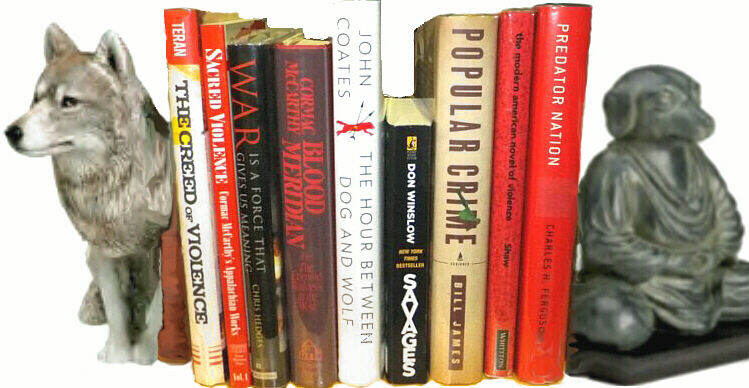One of the more interesting metaphors in Robert M. Pirsig's Zen and the Art of Motorcycle Maintenance is that of Phædrus's knife, of the analytical knife. Confronted with life's blanket sensory information, the intellect cuts patterns from which truths (or at least the inferences of truths) can be drawn.
The inspiration for Pirsig's Phædrus is Plato's work by that name involving Phaedrus, Socrates, love, reincarnation, and the use of euphemistic rhetoric, but there is critical literature which suggests that Pirsig's knife is also inspired by Herrigel's Zen and the Art of Archery, where the bowstring cuts right through the archer.
Not that there aren't other possibilities around. Samuel Beckett's No's Knife, for instance. Material existence is broken down into its elemental parts by our most brilliant seers, though the representative language used to express these ideas contains its own intrinsic shortfalls. At its most concrete, the basic philosophic common denominator becomes almost digital--zero or one, space or mark, off or on, finite or infinite, no or yes.
It always comes down to the glass half-empty or half-full argument, a smile or a frown. You live a life of suffering or you live life with love and gratitude for the gift of it.
"Yes" is James Joyce's final word in Ulysses, and this was an intentional affirmation, an emphatic summation. William Faulkner too said yes to infinite possibilities--at least in The Sound and The Fury and in his Nobel Prize acceptance speech. Cormac McCarthy has followed them both, but in these later years his style has become more spare and Beckett-like--as in The Sunset Limited where he makes Janus-faced the "yes" of James Joyce and the "no" of Samuel Beckett.
 |
| The final words of Joyce's Ulysses |
The Beckett collection, No's Knife, is the subject of a brilliant analysis by Elaine Scarry in her work, Resisting Representation. Scarry suggests that the entire work of Beckett is synthesized here, stripped to its bare essentials. Beckett's idea is that humanity is tragically hung in abeyance, that "it is irrelevant if Godot is God, night, death, Pozzo, silence, or a war agent." If Godot were actually to come, "the vagabonds, no longer waiting for Godot, would merely wait in the presence of Godot for something else. The satisfaction of desire transcends our temporal grasp: the moment we attain satisfaction, we simultaneously lose it, for the old object of expectation is replaced with a new object."
Many secular buddhists refer to this as the hungry ghost.
In a personal letter in the Cormac McCarthy Archives, the author underscored his interest in Elaine Scarry's The Body of Pain, and the two seem to share several conceptual ideas which ultimately appeared in McCarthy's works.
McCarthy is lighter than Beckett, for as Elaine Scarry points out, Beckett was an absurdest. He believed that the world "is defined by uncertainty, ambiguity, and antimony" and that man in this material world is defined "by failure, frustration, and impotence." Beckett insists that we stop reacting to logical absurdity "with a kind of Pythagorean terror, as though the irrationality of pi were an offense against the deity, not to mention his creature."
Beckett's tragi-comedies lean toward tragedy, whereas many other absurdist works--Catch-22, for example--lean more toward comedy. Tom Robbins has expressed much the same philosophy as Beckett, but all of his works delight in the absurdity.
Beckett insists that we live in denial of our true paradox. Perhaps he was right, and I'd agree that generally we live in denial of death and in denial of the emptiness within, but it is sad that his work fails to acknowledge the light--however dimmed now--of love and of human compassion.
The world is divided between smilers and frowners.


















































